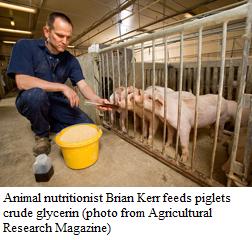Biodiesel producers are looking for a market for a big by-product of the green fuel they make… livestock producers need a high-quality feed. Seems like they need to find a way to get together. Scientists at the U.S. Department of Agriculture are finding a new use for the glycerin produced during biodiesel refining.
This article from the April issue of USDA’s Agricultural Research Magazine says animal nutritionist Brian Kerr, who works at the ARS Swine Odor and Manure Management Research Unit at Ames, Iowa, William Dozier, formerly in the ARS Poultry Research Unit at Mississippi State and now with Auburn University, and Iowa State University colleague Kristjan Bregendahl are looking into how to use crude glycerin as a livestock feed supplement:
 Kerr led studies that examined how crude glycerin feed supplements affected swine energy use. In five different experiments, he supplemented the diets of starter pigs and finisher pigs with different levels of crude glycerin…
Kerr led studies that examined how crude glycerin feed supplements affected swine energy use. In five different experiments, he supplemented the diets of starter pigs and finisher pigs with different levels of crude glycerin…
Pigs fed the crude glycerin were able to digest it efficiently, and it provided them with a supply of caloric energy that basically equaled that of corn grain. A followup study showed no effects on weight, carcass composition, and meat quality in pigs fed diets containing 5 percent or 10 percent crude glycerin from weaning to market weight.
Meanwhile, Dozier and Bregendahl evaluated the use of glycerin supplements in poultry feed. They used 48 egg-laying hens and 1,392 broilers in 4 research studies.
After feeding four levels of crude glycerin to laying hens, Bregendahl determined the AME in the crude glycerin to be 3,805 kcal/kg. He also compared feed consumption, egg production, egg weight, and egg mass (calculated by multiplying egg production and egg weight) and found no significant differences among the four groups.
The scientists say the research has been successful, as the data shows that crude glycerin is an excellent source of energy for pigs and chickens and doesn’t harm animal performance, carcass composition, or meat quality. They do caution that while the glycerin is a great feed supplement, there are some issues that could limit its use, such as small methanol and salt levels.
But overall, this could be a real win-win situation with livestock producers finding a way to cut feed costs and biodiesel producers finding a way to add value to their products.

